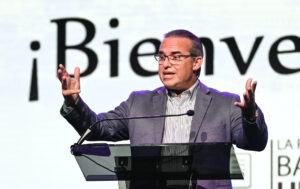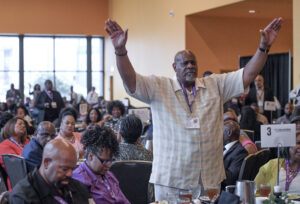
SAUDI ARABIA (BP) –- Saudi officials have postponed — for a third time — the weekly lashing of blogger Raif Badawi, who was to receive 50 lashes 20 consecutive Fridays for insulting Islam.
No reason was given for this week’s postponement, BBC News reported.
Badawi, a 30-year-old husband and father of three daughters, received his first round of lashes Jan. 9 outside the Juffali Mosque in Jeddah after Friday prayers. The lashings were suspended the two following weeks because officials said he had not sufficiently healed from the first beating to endure another.
Meanwhile, Amnesty International said further lashings of Badawi could “cause debilitating long-term physical and mental damage,” based on the analysis of a medical expert from the charity Freedom from Torture.
“The more blows are inflicted on top of one another, the more chance of open wounds being caused,” Freedom from Torture physician Juliet Cohen said in an Amnesty International press release. “This is important because they are likely to be more painful and at risk of infection, which will cause further pain over a prolonged period as infection delays the wounds healing.”
The type of lashing Badawi has suffered is intended to cause internal damage, Cohen said.
“When the cane strikes, the blood is forced from the tissues beneath,” she said. “Damage to the small blood vessels and individual cells causes leakage of blood and tissue fluid into the skin and underlying tissue, increasing the tension in these areas.”
Badawi is also serving a 10-year prison sentence and must pay a fine of 1 million SR ($266,000 US) for 2012 charges stemming from his Liberal Saudi Network, a now-closed website that encouraged open discussion about Islam and politics in Saudi Arabia. An apostasy charge punishable by death was dropped in January 2013. The case has been referred to the Saudi Arabian Supreme Court for review.
Flogging is prohibited under international law.
“Flogging Raif Badawi was un unspeakably cruel and shocking act by the Saudi Arabian authorities,” said Philip Luther, Amnesty International director for the Middle East and North Africa. “The practice violates the prohibition of torture and other ill-treatment under international law and should not be carried out under any circumstances.”
The international community is fighting for Badawi’s release. Notably, seven religious freedom advocates in the U.S. have offered to take 100 lashes each for Badawi, the American Islamic Forum for Democracy reported.
In a Jan. 20 letter to Saudi Ambassador to the U.S., Adel bin Ahmed Al-Jubeir, the signatories offered to take the lashes if Badawi is not released.
“We are persons of different faiths, yet we are united in a sense of obligation to condemn and resist injustice and to suffer with its victims, if need be,” the letter reads. “We therefore make the following request. If your government will not remit the punishment of Raif Badawi, we respectfully ask that you permit each of us to take 100 of the lashes that would be given to him. We would rather share in his victimization than stand by and watch him being cruelly tortured. If your government does not see fit to stop this from happening, we are prepared to present ourselves to receive our share of Mr. Badawi’s unjust punishment.”
Signatories include three members of the U.S. Commission on International Religious Freedom; chair Katrina Lantos Swett, vice chair Robert P. George and Mary Ann Glendon and M. Zuhdi Jasser, president of the American Islamic Forum for Democracy.
Saudi Arabi enforces a strict version of sharia Islamic law that prohibits political dissent. Both the U.N. high commissioner for human rights and the U.S. State Department have requested that Badawi be pardoned or spared his sentence.
Badawi’s wife and children fled to Canada soon after his arrest.















